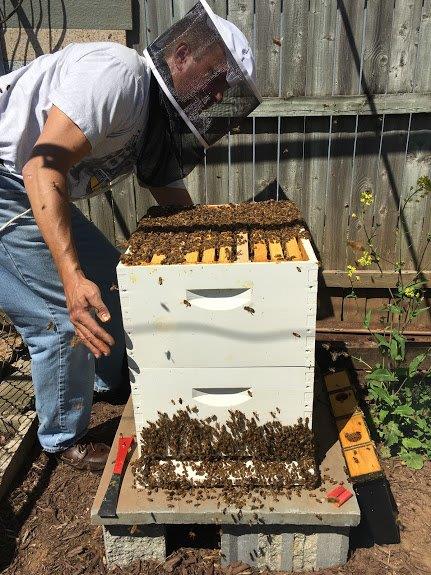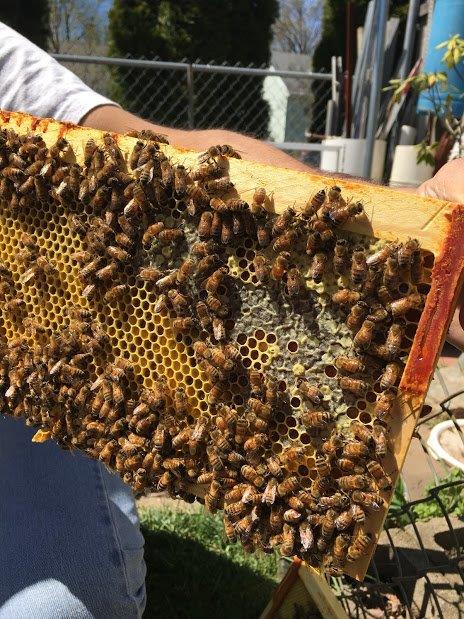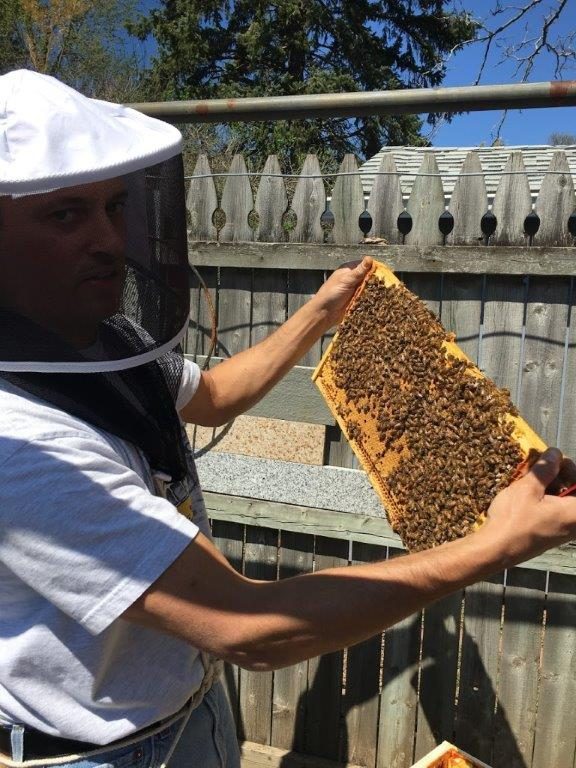Bees Can Buzz in West Hartford: Town Council Approves Beekeeping Ordinance

Audio By Carbonatix

Steven Trifiro tending honey bee hives. Photo courtesy of Steven Trifiro
In a unanimous vote, the West Hartford Town Council passed an ordinance Tuesday night permitting the keeping of of honeybees.
By Jackie Palermo and Gillian Hixson
On Tuesday, June 13, Town Council held a public hearing discussed and then unanimously approved an ordinance allowing West Hartford residents to keep honeybees on their property, subject to certain conditions.
This new ordinance sets the standards for the future beekeepers of West Hartford.
Before the ordinance was created, West Hartford zoning laws surrounding beekeeping were “silent,” and as Town Planner Todd Dumais put it, uses “that are unstated are not permitted.”
Dumais explained that he looked to similar beekeeping ordinances in other Connecticut towns to gain insight and ideas as to how to frame the ordinance.
Dumais offered the example of Wallingford, which allows beekeeping “as of right” rather than through the permit process West Hartford pursued. The benefits to the permit approach, Dumais said, are the notice to others, the ability to verify, and the possibility of future tracking to ensure the standards set by the ordinance are being followed.
The West Hartford ordinance sets forth a minimum lot size of 6,000 square feet as well as the number of colonies, ranging from one colony allowed in zone R6 up to a maximum of four permitted, depending on the zone.
In addition, the bee colonies must be in rear yards, at least 20 feet from all property lines, and a proper flyway barrier of at least 6 feet in height must be installed in front of the hive. A source of fresh water must also be provided.
The ordinance also includes rules about signage while the property owner waits for the beekeeping application to be approved by the town. Property owners must put up a sign in their yard in order to inform all adjoining neighbors about their pending application. This signage is only required for 30 days while the permit is being reviewed, Dumais said.
The purpose is “to provide public notice,” Dumais stated.
Though Dumais explained the reasoning behind the signage, Town Council member Beth Kerrigan pointed out the potential impracticality of the signs. Although she wholeheartedly favors encouraging beekeeping in town, Kerrigan said she wondered whether the signage may deter residents from beekeeping due to possible disagreements between neighbors but also indicated that if the individual meets zoning regulations, neighbors’ complaints to the beekeeping will not have any impact on the status of the permit.
Patrick Alair, West Hartford’s Corporation Counsel, clarified, saying the sign would only read “Zoning Application Pending.” There would be no explicit mention of bees. Concerned neighbors would have to call Dumais in order to find out what permit was pending.
Alair reiterated, “This is a zoning ordinance,” meaning it concerns land use only. While concerns might be noted, permits will still be granted if the application meets the criteria outlined in the ordinance.
Also due to the fact that the ordinance lies under the category of zoning, the beekeeping permit has a fee of $135, Dumais said. The basic permit fee is $70, and the application for a land use permit triggers a Department of Energy and Environmental Protection Permit fee of $65.
Many of the council members debated the necessity of this application fee, given that the punishment for having unregistered bees is merely a citation and that owning bees is a service to the public.
However, because it is a zoning ordinance, the fee is necessary. “It is the vehicle we chose,” Dumais stated, “It is what it is.”
Several residents spoke at the public hearing, including Albany Avenue resident Arnold Chase who said he has purposely planted acres of wildflowers and alfalfa on his property to support bees. He suggested that the Town Council modify the ordinance to allow for more than four colonies on larger pieces of property.
Mark Creighton, the apiary inspector for Connecticut, is a major proponent of beekeeping but did offer some additional suggestions to the town about the ordinance. He spoke at the public hearing, suggesting the need for a “practical management aspect.”
Creighton stated, “All issues boil down to unhealthy bees,” and suggested the inclusion of “educational components for beekeepers” in the ordinance.
Creighton indicated that the greatest risk is not that the bees will harm anyone, but rather, that they will die out quickly. In order to be an effective beekeeper and have happy, healthy bees, the owners need to be properly trained.
There is no mandated “Beekeeping School” or classes that applicants are required to take, but the Connecticut Beekeepers Association does offer, and highly recommend, Bee School.
Creighton went as far as to state that “proper bee management techniques” are more important than flyways, setbacks, and hive limits.
He offered his own beekeeping advice, which he has gained from personal experience. The West Hartford ordinance requires beekeepers to have an “on-site source of fresh water” for the bees, but Creighton said, “They just don’t like fresh water. I’ve been trying to get my bees to drink fresh water for 15 years. They like the most brackish, dirtiest water.”
And, “They really like coffee by the way,” he added with a laugh.
Although the current ordinance only allows one to four hives per property, an important point was made by Creighton that most beekeeping associations and experts will insist that hives be bought in two as part of proper bee management.
Creighton explained that you need two hives to compare to each other when one colony is sick. You cannot prevent, treat, or even recognize that there is a problem unless you can see a difference in the health of two colonies, he said.
Steve Trifiro, who has become known in town as the “bee guy” for his promotion of the beekeeping ordinance, also spoke about the importance of education in the path to becoming a beekeeper.
Trifiro calls himself “an accidental beekeeper,” explaining that if you asked him six or seven years ago he never would have thought he would be doing this. But, after seeing beekeepers caring for their hives incorrectly, he decided to educate himself.
People are concerned about getting stung, but the risk of being stung by honeybees is very low. “They don’t want to sting you because they die,” Trifiro said.
The majority of a bee colony is comprised of female bees, Trifiro said. Male bees are only needed for reproduction and don’t even have stingers.
All of the bees that are being raised in Connecticut are purchased from out of state, but if cared for properly they can live in this climate, even through the winter when the colony huddles in what Trifiro and Westmoor Park beekeeper Kevin Krebsbach both described as a “fuzzy cocoon,” vibrating around the hive to stay warm.
Trifiro explained the impetus for the ordinance and how he came to be known as the bee guy during an interview with We-Ha.com before Tuesday night’s meeting. He said that it started when his father-in-law was given a hive several years ago, which prompted him to call the town and inquire about any rules or regulations concerning beekeeping. The woman he spoke to mentioned nothing about bees being an issue, so he thought it was okay.
Eventually Trifiro received a citation from the town after a contractor working for a neighbor of his was stung by a bee that he assumed came from Trifiro’s hive.
Trifiro took the issue to the Zoning Board of Appeals, and though he had to move the bees to Wethersfield, Trifiro said Dumais was supportive and receptive to an ordinance allowing bees.
In the unanimous approval, Town Council members said the beekeeping ordinance is a victory for the community and for the bees.
“This is a great starting point,” Mayor Shari Cantor said after the vote. She thanked the West Hartford Town Council for taking the first step, of hopefully many, toward improving the livelihood of honeybees.
Like what you see here? Click here to subscribe to We-Ha’s newsletter so you’ll always be in the know about what’s happening in West Hartford!

Steven Trifiro tending honey bee hives. Photo courtesy of Steven Trifiro

Steven Trifiro tending honey bee hives. Photo courtesy of Steven Trifiro




What great news! Our city passed an ordinance a couple years ago and it seems to be the trend. Training is certainly important but if anyone is interested don’t be intimated! Beekeepers Associations are a great way to start but the company I bought my hive from worked with my personally and offers a massive amount of info on their website. They’re hives are sustainable top-bar hives that keep the bees healthier and you safer! https://www.beepods.com/